
Even in a world defined by evolving artificial intelligence and changing customer preferences, the importance of content marketing is difficult to overestimate.
According to recent studies, more companies are discovering and leveraging content marketing benefits than ever before. Around 44% of companies said improving the value and quality of their content has generated success.
45% say they’re publishing content more frequently, and 69% of brands say they plan on increasing their content marketing budgets by the end of this year.
Content marketing doesn’t just help to begin a conversation with your audience; it also contributes to consistently strengthening relationships with new and existing buyers.
With the right content marketing strategy, you can more effectively capture customer attention, convert buyers into lifelong advocates, and improve your brand reputation.
In this post, we’ll look at the 10 biggest advantages of content marketing.
10 Top Content Marketing Benefits
- Increased Brand Awareness
- Building Trust and Credibility
- Improved Search Engine Visibility
- Increased Targeted Website Traffic
- Generate More Leads and Conversions
- Cost-Efficient Marketing Channel
- Personalization and Audience Engagement
- Nurturing Strong Customer Relationships
- Measurable Results and Analytics
- Brand Authority and Thought Leadership
1. Increased Brand Awareness
Content marketing benefits companies throughout the entire customer lifecycle. However, one of the biggest advantages of effective content is its ability to draw attention to your brand in a competitive marketplace.
The right content doesn’t just resonate with your audience emotionally; it encourages customers to share their thoughts with colleagues and friends, expanding your reach on virtually every online platform.
The more brand awareness you earn, the more customers can form connections with your business, increasing potential sales and opportunities.
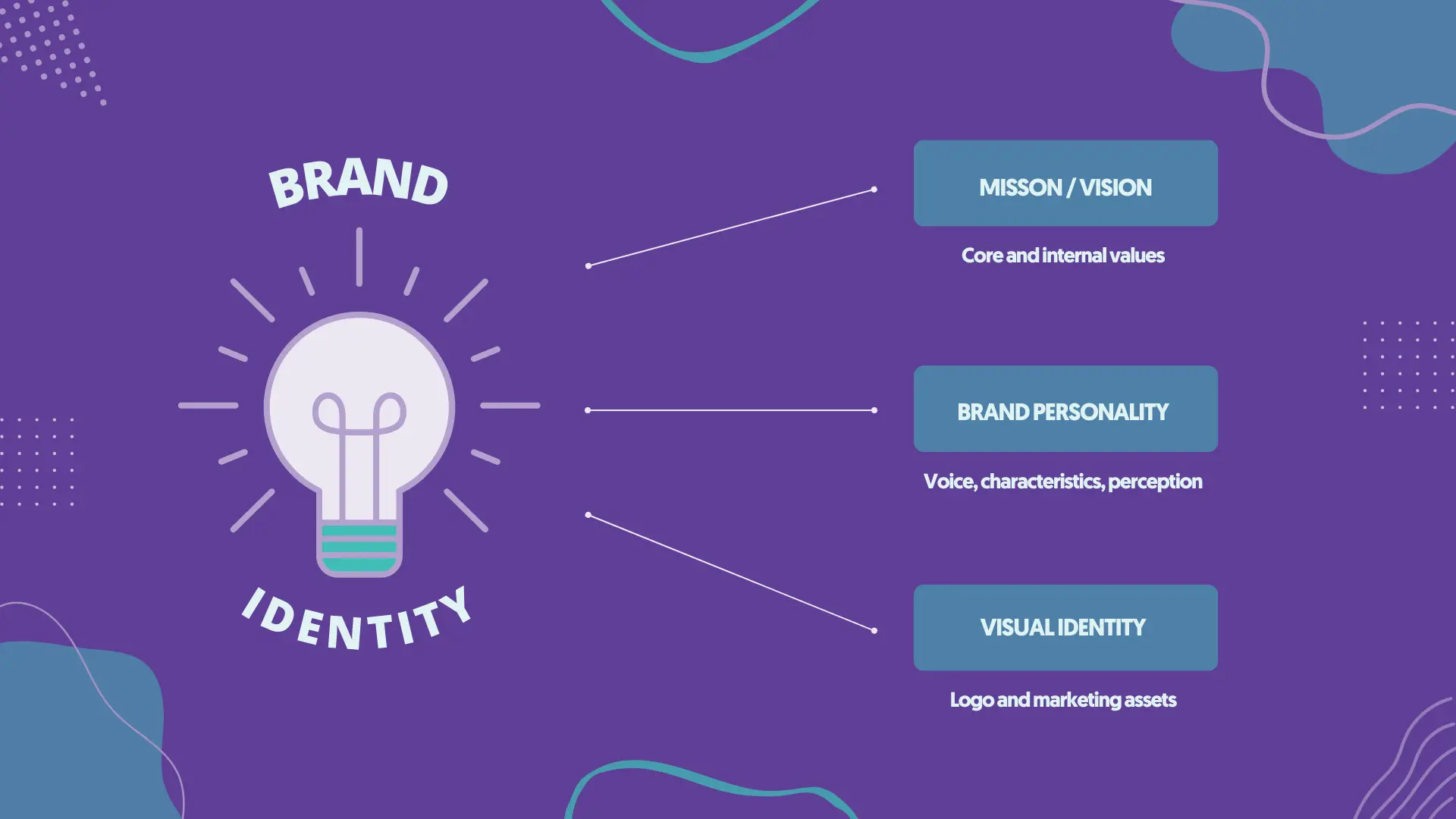
2. Building Trust and Credibility
Trust has become one of the most essential components of effective content marketing in recent years.
This is particularly true since Google introduced its E-E-A-T guidelines, which push content reviewers to evaluate content based on its ability to display expertise, authority, trust, and experience.
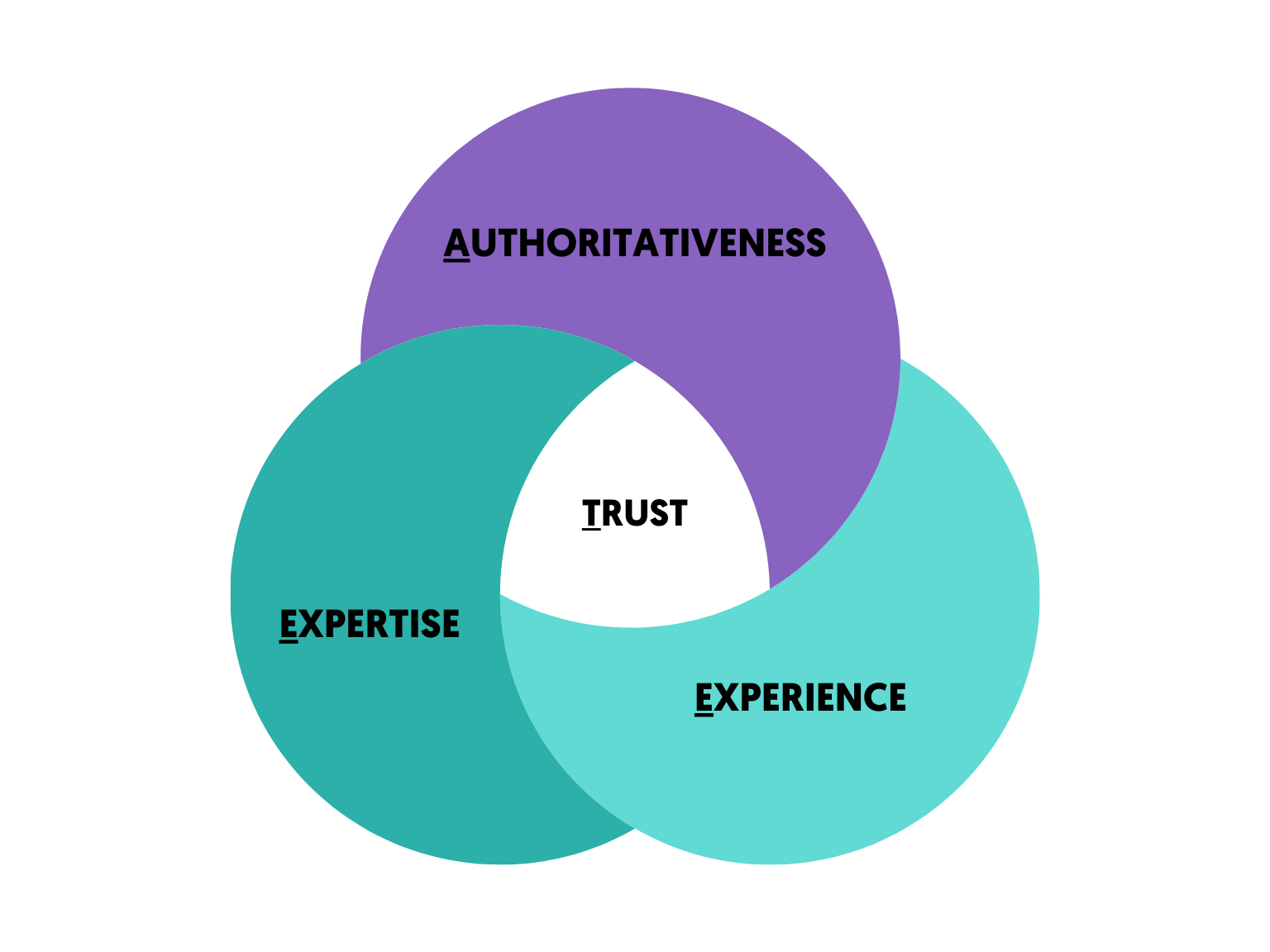
There are a few different ways content can contribute to the credibility of your brand. First, it’s an opportunity for companies to showcase their knowledge and understanding of a subject.
Consumers are more likely to trust companies that demonstrate their knowledge of the industry through case studies, blogs, whitepapers, videos, and podcasts.
Just look at Salesforce, for instance, it constantly shows customers how knowledgeable it is about customer relationships, sales, and technologies through comprehensive blogs, written by industry experts with their own remarkable author bios.
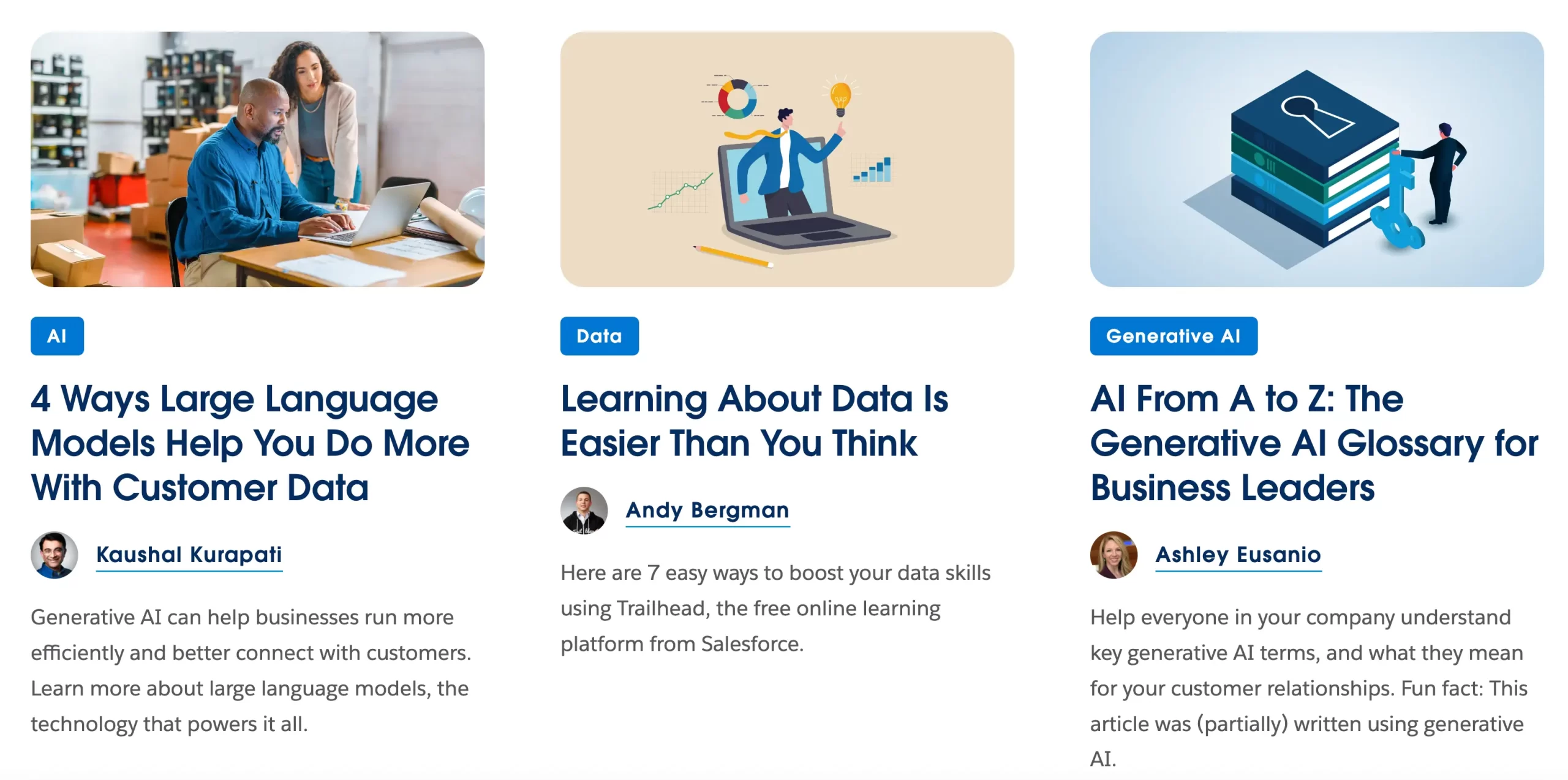
The company also produces webinars, events, and other forms of content specially designed to educate and inform its target audience.
At the same time, by combining content with SEO techniques, they appear at the top of the search engine results pages for crucial terms like “CRM” and besides traffic, this generates many other benefits for their brand.
3. Improved Search Engine Visibility
Speaking of search engine optimization, content is by far the best way to boost your chances of strong search engine visibility. One of the biggest content marketing benefits touted by any major brand relates to online visibility on channels like Google.
Ultimately, you can’t win at SEO without having a killer content marketing strategy.
With effective content marketing, business leaders can ensure their websites appear at the top of the search results for keywords relevant to their customers and industry.
Shopify, for instance, appears at the top of the SERPs for a range of ecommerce-related terms.

It stands out in the search results not just through carefully optimized site copy, but also thanks to its strong approach to content marketing, which includes comprehensive blogging, webinars, and other forms of content.
High-quality content also improves your chances of other authoritative companies linking back to your website. Although there aren’t many insights available from Google into the direct impact backlinks have on SEO, they do seem to play an important role.
The more backlinks a page has, the more organic traffic it generally receives from Google. What’s more, additional backlinks make it easier for customers to find your website from other sources, and boost the authority and credibility of your site, improving your E-E-A-T score.
4. Increased Targeted Website Traffic
Since the advantages of content marketing include increased visibility and a greater SEO performance, it’s probably no surprise that content can improve your site traffic too.
Studies show that annual growth in unique site traffic is 7.8 times higher for content leaders.
However, effective content marketing doesn’t just increase your overall traffic numbers. Used correctly, it can also ensure you attract more specific, targeted traffic to your site.
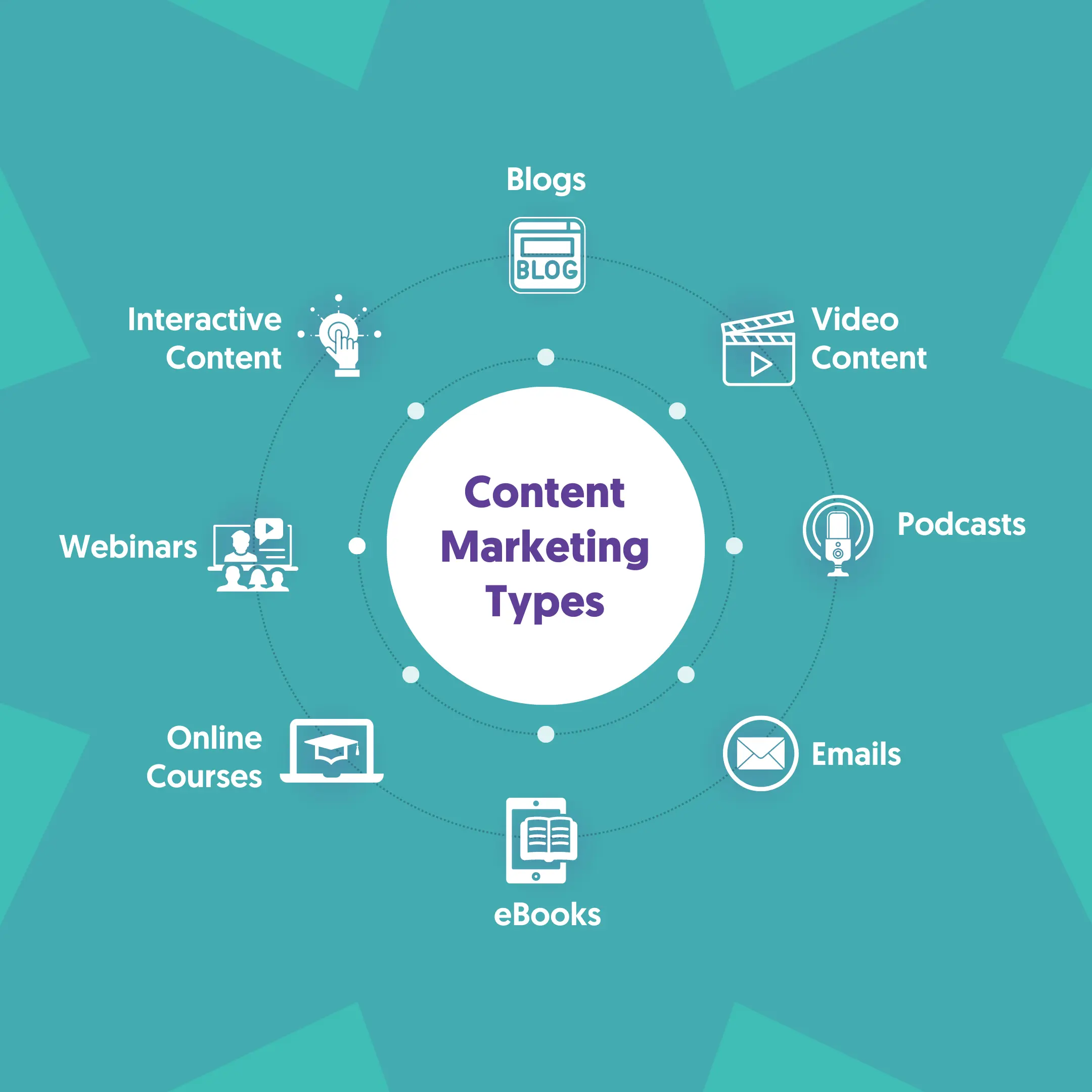
With a well-defined content marketing strategy, you can target keywords and phrases, as well as questions and concerns affecting customers throughout the buyer journey.
You can ensure you’re connecting with specific customers based on their unique needs and interests, improving the quality of the leads that arrive on your site. You can even target different audiences with various kinds of posts. For instance, Mailchimp creates content specifically for agencies, freelancers, and larger businesses.
An effective content marketing strategy can include:
- Awareness content: Pieces designed to educate and attract customers at the top of the sales funnel (blog and social posts, infographics, and whitepapers).
- Consideration content: Case studies, webinars, and reviews offering customers a deeper insight into your solutions.
- Conversion content: Pieces that help customers validate their decision to purchase your products and services, such as demos or free trials.
- Retention content: Content that helps to increase customer success through insights and education (documentation, how-to guides, and webinars)
5. Generate More Leads and Conversions
One of the main reasons all companies should be aware of the importance of content marketing is that it can help to increase sales and revenue. HubSpot found companies that prioritize content marketing are 13 times more likely to see a positive ROI.
Content helps companies to earn the trust of their target audience, demonstrate their thought leadership, and encourage sales throughout the sales journey.
In one case study, Rock Content even increased its annual recurring revenue by 650% and its leads by 78%, simply by investing in a more strategic approach to content marketing, with personalized content for different audience segments.
With the right content marketing strategy, companies can help customers make the right decisions through the purchasing journey. They can assist businesses with comparing different products and solutions, and guide them towards the right sale.
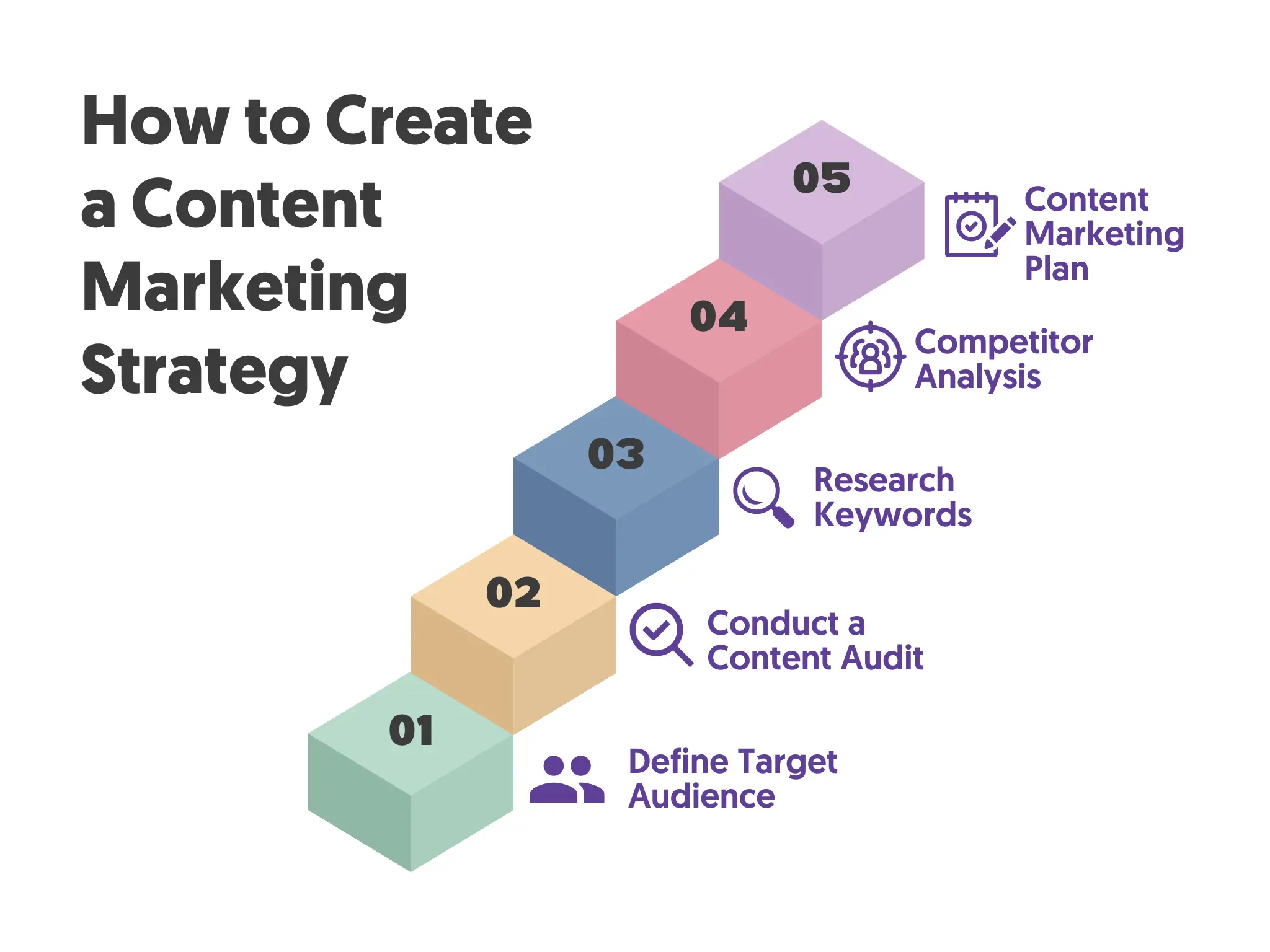
What’s more, with retention-focused content, designed to educate and inform customers, businesses can also increase customer lifetime value. B2B companies and subscription-based brands regularly use content to help retain subscribers and buyers.
This form of content can also help to transform existing buyers into advocates, who can refer new sources of revenue to your business. Just look at how Dropbox produces shareable content its existing customers can send to their friends for insights into the cloud industry.
6. Cost-Efficient Marketing Channel
The great thing about content marketing benefits is they’re not reserved entirely for bigger brands with huge marketing budgets. While other forms of advertising, such as paid referrals and PPC require a large upfront and ongoing investment, content is extremely affordable to produce. It also continues to generate compounding results over time.
When you stop investing in a PPC campaign, your results will naturally begin to dwindle. However, content, particularly evergreen content designed to remain relevant over time, continues to attract leads and prospects for years to come.
According to Demand Metric, content marketing generates three times the average leads of other marketing channels, but costs up to 62% less to produce.
Though content marketing isn’t free, it’s a lot more affordable in general than other forms of advertising. Today’s digital world even makes it possible for companies to hire freelancers and contractors to help with the creation of content, rather than investing in in-house staff.
HubSpot found over 10 years, content marketing has remained the most cost-effective marketing strategy available, with the biggest potential return on investment.
7. Personalization and Audience Engagement
One of the other major advantages of content marketing is its flexibility. While most people think of “blogging” when they hear the term “content marketing”, there are many different types of content businesses can create for various purposes.
A strong content marketing strategy gives businesses the freedom to experiment with a wide range of resources to attract, convert, and engage customers.
You can create blogs specially designed for specific segments of your audience. For instance, SAP has a range of posts and resources arranged into segments for people interested in different parts of their product portfolio.
You can also explore how different types of content resonate with your customers, producing videos, blog posts, podcasts, infographics, and more.
For instance, HubSpot’s resource center is brimming with templates, videos, webinars, and various other tools, tailor-made for each customer segment.
You can even promote your content across different channels, from social media to email, to boost your chances of reaching customers wherever they might be.
8. Nurturing Strong Customer Relationships
As mentioned above, great content marketing doesn’t just initiate a conversation with customers, it forms the foundation for a strong and long-lasting relationship. According to McKinsey, consistency is one of the most important factors in earning customer loyalty.
Producing content regularly and sharing it across the right channels gives you an opportunity to build familiarity with your target audience. The more you share valuable content, the more connected customers will feel to your brand.
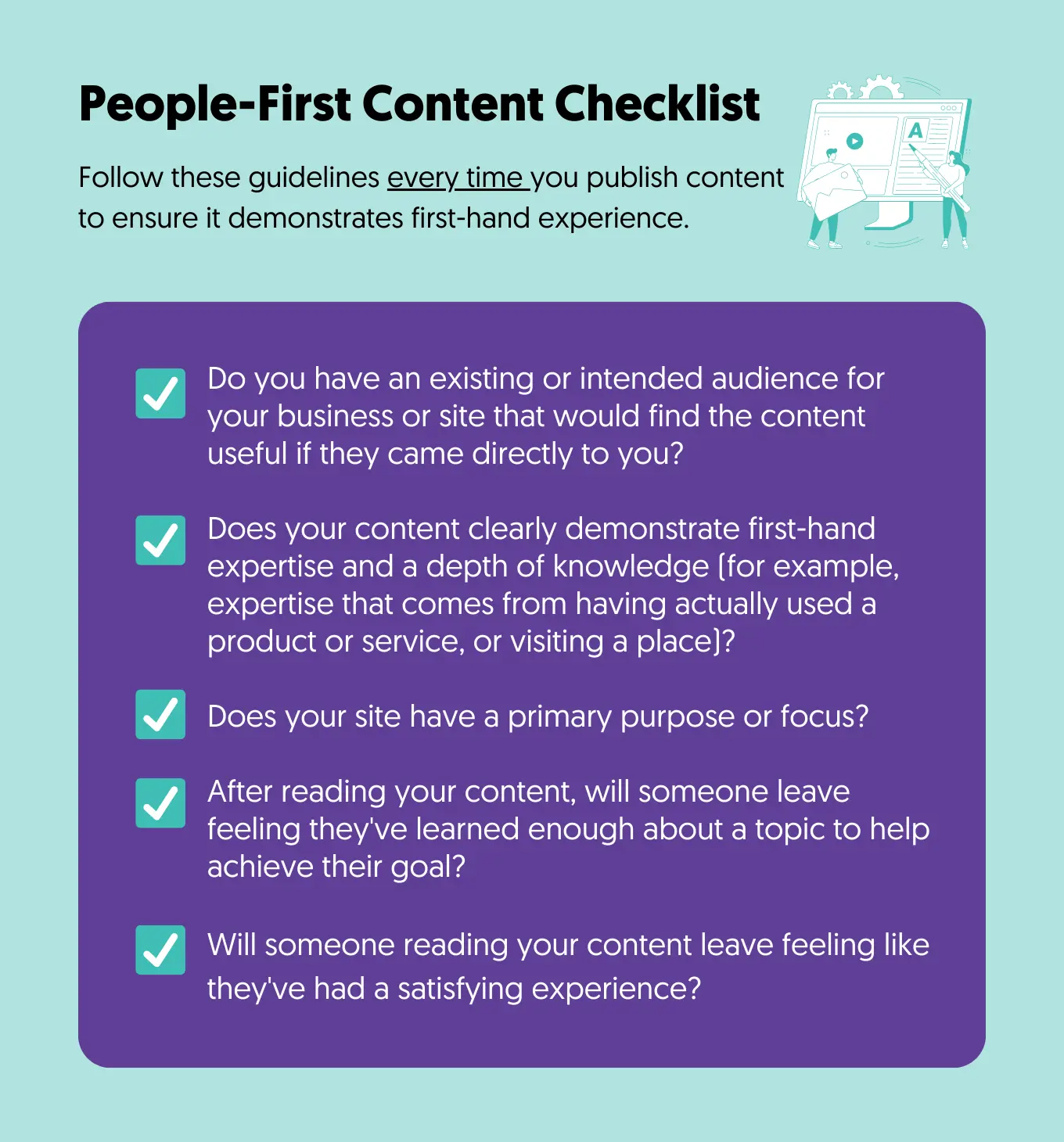
By creating content for all stages in the customer journey, you can also ensure your customers can rely on you to answer any questions they might have. Your valuable content demonstrates how you can help consumers mitigate pain points and reach their goals.
It’s also a fantastic way to showcase your unique brand personality, which helps to build affinity with the customers you want to reach. Patagonia, for instance, regularly shares customer stories and blogs that demonstrate it’s commitment to sustainability.
This shows customers that they’re working with a company that shares their specific values and priorities, increasing loyalty. A strong content marketing strategy can also strengthen relationships with existing customers, demonstrating a commitment to customer success, even after a buyer completes a purchase.
9. Measurable Results and Analytics
To access the biggest content marketing benefits, businesses need more than just a well-defined strategy. They need insights and data. Some marketing strategies can be difficult to measure, as it’s often tough to see the correlations between adverts and sales.
However, content marketing is an extremely measurable form of promotion. With free tools like Google analytics, companies can track exactly how many customers they’ve earned from specific blog posts, video campaigns and other strategies.
You can track how long customers spend on specific pages, how many customers share links to your posts on other platforms and more.
With the right content marketing metrics and insights, you can then invest in more effective ways to drive sales and business growth. Using the right data, you’ll be able to create unique content for different segments, increase the ROI of specific campaigns, and even improve the results of other marketing campaigns.
For instance, if you know which blogs generate the most sales and attention for your business, you also know what kind of content you should be sharing via email and social media. You can even use your insights to better understand your audience segments, the buyer journey of customers, and more.
10. Brand Authority and Thought Leadership
Finally, as mentioned above, content contributes significantly to your reputation in any industry. It doesn’t just generate trust, it gives you a way to separate your business from other competing organizations, with useful insights.
Today’s customers are looking for more than just products and services. They want long-term relationships with brands they can trust to deliver the best experiences.
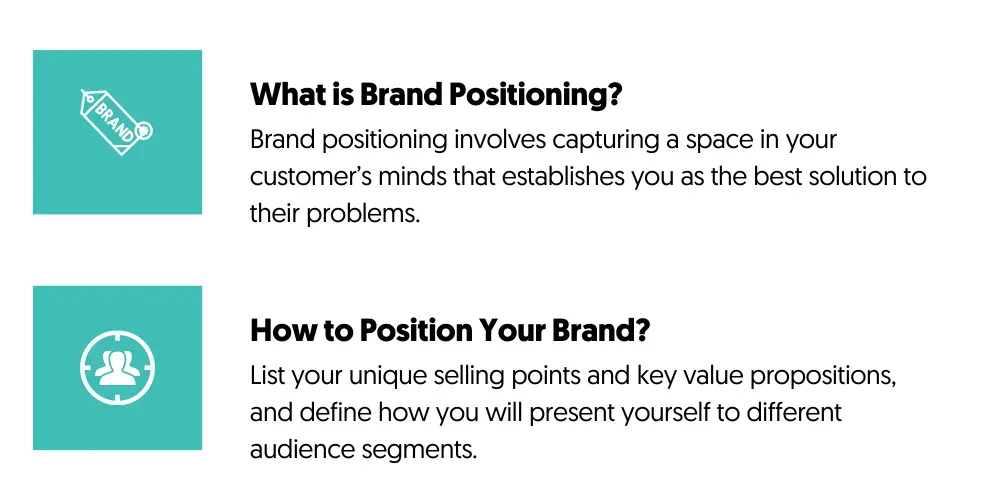
With the right content, you can position yourself as an authority, capable of offering valuable guidance and support to customers throughout the buyer journey. This can be particularly valuable in some industries. For instance, research shows 49% of B2B decision makers say thought leadership content directly influences purchasing decisions.
Additionally, another 89% of decision-makers say they believe thought leadership content improves their perception of a company. Producing high-quality content that follows Google’s E-E-A-T guidelines gives your brand an edge over the competition.
For instance, Autodesk has a massive resource center dedicated to the various types of products and solutions it offers. Each segment addresses specific customer queries and concerns with pieces written by industry leaders.
Conclusion
Ultimately, content marketing benefits extend beyond simply giving your business more visibility and presence online. The right content marketing strategy can strengthen your relationship with customers, increasing their lifetime value, and your revenue.
Additionally, content gives you an opportunity to position yourself as a leader in your space, address customer concerns throughout the purchasing cycle, and boost brand loyalty.
The importance of content marketing is something no business can afford to overlook, no matter their size or industry.
To learn more about content marketing, read the following guides:
- Best Content Marketing Courses
- Content Marketing Guide For Beginners
- How to Get Into Content Marketing





